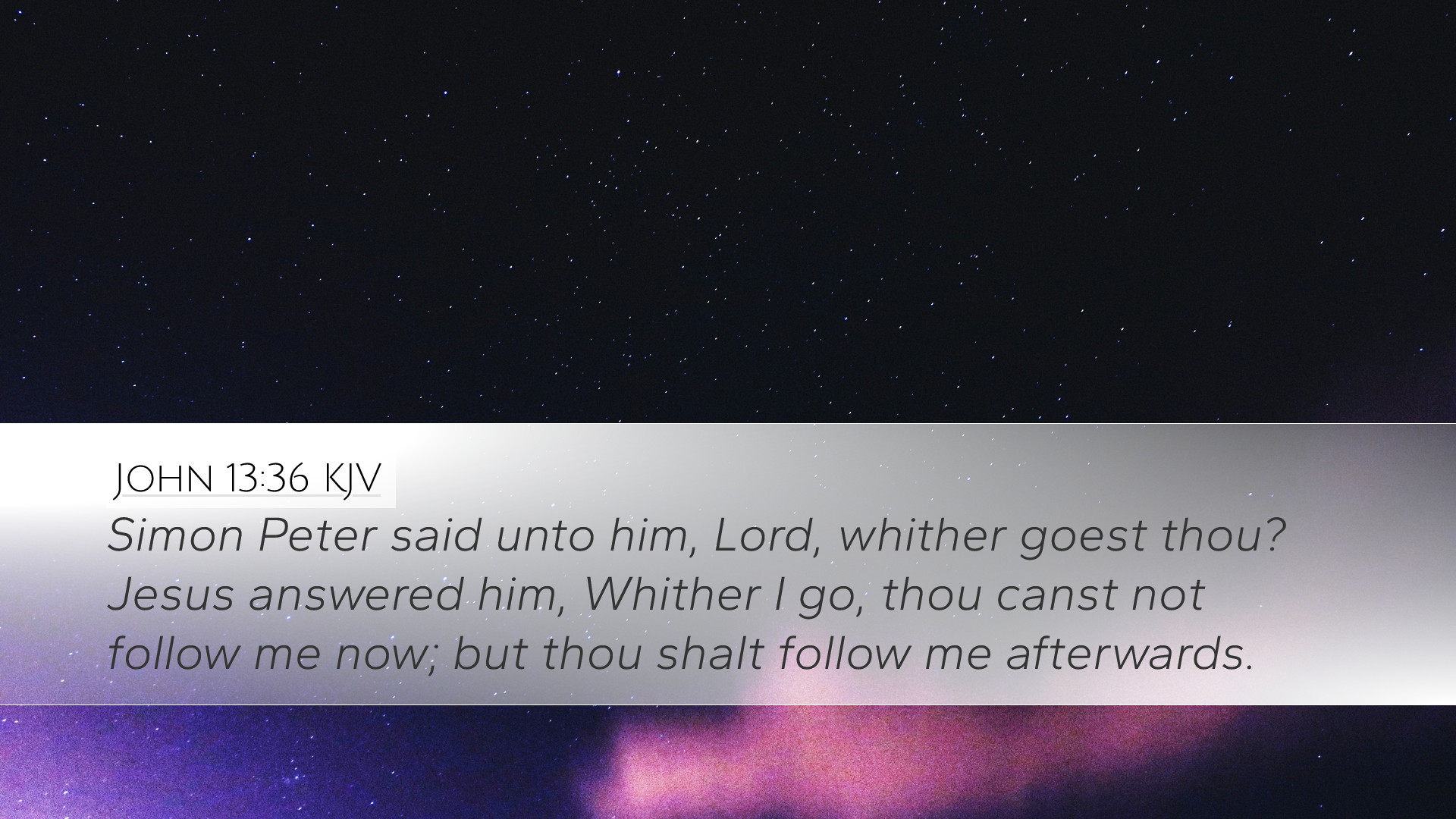Commentary on John 13:36
John 13:36 reads: "Simon Peter said to him, 'Lord, where are you going?' Jesus answered him, 'Where I am going you cannot follow me now, but you will follow afterward.'
Introduction
This profound exchange occurs in the Upper Room, where Jesus prepares His disciples for the trials ahead. The context is critical; it unfolds during the Last Supper when Jesus reveals the impending betrayal, and Peter, eager and outspoken, demonstrates both confusion and devotion as he seeks understanding.
Context and Setting
Matthew Henry emphasizes the emotional weight of this moment, illustrating that the atmosphere is heavy with impending sorrow. Jesus, knowing His time is short, speaks of His forthcoming departure in a manner that is both reassuring yet mysterious.
The Role of Peter
Peter's inquiry, "Lord, where are you going?" reflects his leadership role among the disciples and his desire to be near Jesus. Albert Barnes notes that this question is emblematic of Peter's characteristic impulsiveness and zeal. His love for Christ compels him to seek clarity about the future, revealing a heart that seeks to remain united with the Savior.
Interpretation of Jesus' Response
Jesus responds with a statement laden with theological depth: "Where I am going you cannot follow me now." Adam Clarke highlights that this indicates a distinction between the immediate journey of Jesus—His death, resurrection, and ascension—and the eventual calling that awaits Peter and the other disciples. Jesus alludes to a spiritual truth whereby His path involves suffering that they cannot yet comprehend.
Five Key Insights from Commentaries
- The Mystery of Divine Providence: According to Matthew Henry, this moment signifies the mystery of God's plan. Jesus' departure is a divine necessity for redemption.
- Impermanence of Immediate Rewards: Albert Barnes sheds light on the idea that followers of Christ may not understand all that happens in their lives, affirming the call to trust even amid uncertainty.
- Future Glory: Adam Clarke emphasizes the promise of future unity with Christ. While they cannot follow Jesus now, there is a guarantee of communion in the resurrection.
- The Assurance of Growth: Jesus reassures Peter that despite current limitations, there is a journey of discipleship that ultimately leads to glorification.
- Encouragement for Believers: The overarching theme of hope resonates as believers are reminded of their own eventual following of Christ into eternal fellowship.
Theological Reflections
In reflecting on the theological implications, we recognize the tension between the 'now' and the 'not yet.' While Peter's sincere desire to follow represents the believer's longing for closeness with Christ, Jesus' words serve as a reminder of the process of sanctification that each believer endures. Henry posits that Jesus highlights the necessity of divine timing, encouraging believers to wait in faith for the fulfillment of God's promises.
Practical Applications for Today’s Believers
- Patient Trust in Divine Timing: Just as Peter had to wait for his time to gloriously follow Christ, believers today must cultivate patience and trust in God's timing for their own journeys.
- Understanding Suffering: Jesus' path involved suffering, setting a precedent for believers that struggles are often a part of the spiritual journey, as emphasized by Clarke.
- Hope in Future Glory: Reflecting on the promise of eventual participation in Christ's glory fosters resilience and hope amid tribulation.
- Desire for Intimacy with God: Peter's question embodies a heart yearning for closeness with Christ, which should inspire believers to actively seek a deeper relationship with the Lord.
Conclusion
John 13:36 is rich with meaning and practical applications for believers. The careful exegesis from respected commentators provides insight into the dynamics of devotion, the nature of discipleship, and the promise of everlasting union with Christ. As we reflect on this passage, may we find encouragement in our own faith journeys, holding fast to the hope of following Christ into the fullness of eternal life.


